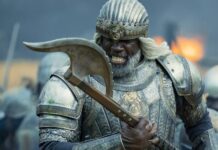I’ll admit — I joined the “Game of Thrones” hype pretty late. It was only upon hearing the uproar about the show’s final season in 2019 that I decided to jump into the series. Sure, call me a fake fan or a bandwagoner, but there was something charming about watching a show that took the world by storm during the post-hype period after its ending. It was during that initial viewing that I understood how a fantasy series featuring magic, dragons and an obscene amount of blood and gore could become a worldwide indulgence. And shortly thereafter, it became mine.
Though the show is far from perfect, I truly believe that seasons one through six of “Game of Thrones” represent some of the most successful book-to-screen adaptations that we’ve ever seen, as evidenced by the record number of Emmy wins amassed by the series. Barring the writing, seasons seven and eight — though infamous for their erratic and contrived plots — exceeded expectations in every other department. I ripped through George R.R. Martin’s “A Song of Ice and Fire” prior to my second rewatch of “Game of Thrones” (mind you, that was 4,244 pages read during quarantine) to fill in the gaps and understand exactly what was executed well and what was not. After all of that, I think I’ve got my obsession down to a science.
“A Song of Ice and Fire” and, subsequently, the “Game of Thrones” TV series have a poignant focus on humanity, especially in the first six seasons of the show. Yes, on the outside, the series looks like “dragon lady and ice monster,” but it’s so much more than that. In a world where more power is just an arm’s length away, how far will you go for a taste of it? Whom will you betray? What does family, honor, duty, friendship and love mean to you? And after the fact, once you’ve gotten what you think you deserve, are you strong enough to keep it? Who really knows what it means to rule? All these questions and more are discussed continuously throughout the series — book and TV alike.
Each and every one of Martin’s characters contain layers of complexity, their internal monologues rife with conflict and self-doubt. For most of the series, the extremely talented cast of “Game of Thrones” managed to display these conflicts through their acting. It felt rewarding to watch Emilia Clarke (“Me Before You”) as Daenerys Targaryen prove her worth, and one can’t help but to marvel at Lena Headey’s (“300”) deliciously evil performance as Cersei Lannister. What was even more satisfying for me, as someone who’s also read the source material, was to understand why these characters act the way they do. Daenerys spent her childhood running from assassins and lived under the tyrannical rule of her psychotic brother. Cersei felt cheated by her father for being a woman and was haunted by a damning prophecy. Jon (Kit Harington, “Pompeii”) had to prove himself capable at every turn, staying loyal to a family that may never consider him as theirs. Tyrion (Peter Dinklage, “Cyrano”) spent his life as the hated child, trying and failing to live up to his siblings in the eyes of his father. The list goes on and on.
I can’t discuss the characters of “A Song of Ice and Fire” without mentioning the monumental chunks of the series that the TV adaptation left out or warped. One of my biggest gripes with the show was the unnecessary omission of characters and the transference of certain characters’ arcs to others. In reading the books, I was utterly captivated by the Dornish characters — the royals of House Martell that lived in the southernmost region of Westeros. They had nuance, passion and strength — and yet, half of them don’t exist in the TV adaptation. The omission of these characters (including my personal favorite, Princess Arianne Martell) reduced the Dornish storyline to a mere caricature of what it was in the books, ultimately leading to some of the most out-of-character decisions made by anyone in the television series.
Going back to the good stuff, coming in at a close second to Martin’s wonderfully written characters is the show-specific special effects and score composition. See, when I indulge in a piece of media, I indulge in all parts of it. Reading about battles, dragons and wildfire will never be enough. “Game of Thrones” went above and beyond to put the viewers there, with camera angles that made you feel like you were in the midst of massive battles and effects that genuinely made your jaw drop. Composer Ramin Djawadi delivered some of his best work throughout the series, enhancing the show’s drama with pieces like “The Rains of Castamere” and “The Night King.” I’ll never forget the “oh, shit” moment of hearing remnants of the title track in “Light of the Seven,” shortly before the Sept of Baelor explodes, and Cersei diabolically sips her wine. The crew of “Game of Thrones” deserves just as much praise and hype as the cast gets. Without them, we wouldn’t have award-winning episodes like “The Winds of Winter,” “Battle of the Bastards” and “The Rains of Castamere,” which, in my opinion, represent the absolute pinnacle of art.
“Game of Thrones” represents a perfect symphony. Until seasons seven and eight, it was safe to say that the show was the product of perfect storytelling, directing, acting, score composition and special effects. Even despite the rogue writing of the final seasons, season eight brought us some of the best compositions of the entire series, and the show’s set design and special effects crew delivered on dozens of breathtaking visuals. The final season gets a lot of (mostly well-deserved) hate for its writing, but watching HBO Max’s “Game of Thrones: The Last Watch” rightfully highlights the years of work in all the other aspects put in by the crew.
“A Song of Ice and Fire” and “Game of Thrones” are close to my heart for so many different reasons. There are plenty of things to criticize (which would take another article to get through), but it’s not something I shy away from. I go back to this beloved series time and time again, for the parts I adore but also for the parts I don’t. One can only hope that we get the written ending to Martin’s series sometime soon. We must also hope that the hype for this universe isn’t dead, and that spinoff shows like the upcoming prequel “House of the Dragon” prove its worth. Judging by the already-completed source material, new writers and released trailers, it will. One thing is for sure, though — this series will always be my preferred indulgence. And when one of my friends tells me, “Swara, I started watching that damn show you love so much,” I smile because it might become theirs, too.
Daily Arts Writer Swara Ramaswamy can be reached at swararam@umich.edu.




















![[Book Review] The Blade Itself (The First Law Trilogy) by Joe Abercrombie](https://bendthekneegot.com/wp-content/uploads/2018/01/1516047103_maxresdefault-218x150.jpg)

















